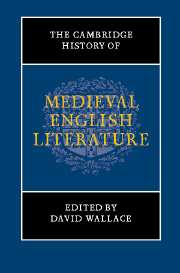Book contents
- Frontmatter
- I AFTER THE NORMAN CONQUEST
- II WRITING IN THE BRITISH ISLES
- III INSTITUTIONAL PRODUCTION
- IV AFTER THE BLACK DEATH
- V BEFORE THE REFORMATION
- Introduction
- 24 Hoccleve, Lydgate and the Lancastrian court
- 25 Lollardy
- 26 Romance after 1400
- 27 William Caxton
- 28 English drama: from ungodly ludi to sacred play
- 29 The allegorical theatre: moralities, interludes, and Protestant drama
- 30 The experience of exclusion: literature and politics in the reigns of Henry VII and Henry VIII
- 31 Reformed literature and literature reformed
- Chronological outline of historical events and texts in Britain, 1050–1550
- Bibliography
- Index of manuscripts
- Index
Introduction
from V - BEFORE THE REFORMATION
Published online by Cambridge University Press: 28 March 2008
- Frontmatter
- I AFTER THE NORMAN CONQUEST
- II WRITING IN THE BRITISH ISLES
- III INSTITUTIONAL PRODUCTION
- IV AFTER THE BLACK DEATH
- V BEFORE THE REFORMATION
- Introduction
- 24 Hoccleve, Lydgate and the Lancastrian court
- 25 Lollardy
- 26 Romance after 1400
- 27 William Caxton
- 28 English drama: from ungodly ludi to sacred play
- 29 The allegorical theatre: moralities, interludes, and Protestant drama
- 30 The experience of exclusion: literature and politics in the reigns of Henry VII and Henry VIII
- 31 Reformed literature and literature reformed
- Chronological outline of historical events and texts in Britain, 1050–1550
- Bibliography
- Index of manuscripts
- Index
Summary
This section begins and ends with paired chapters on dynasties (Lancastrians, Tudors) established more by force of arms than by claims of birthright. Use of force crucially threatens to expose aspiring or usurping monarchs as mere magnates among magnates; such perceptions need to be rapidly foreclosed through self-legitimating or diversionary practices at court (chapters 24, 30), at church (25, 31), or in outward-focused territorial expansionism. Processes of Englishing, vigorously pursued throughout the fourteenth century, assume increasing importance as English monarchs identify themselves ever more closely with the English tongue. Expanded popular access to English texts, however, leads secular and religious authorities to worry about who might be reading what to whom, and to what end; the spread of print culture frustrates attempts at centralized regulation of reading by class, gender and location. William Caxton (chapter 27) astutely balances the pleasing of putative royal patrons against the more certain demands of a broader market. Guild-sponsored drama in the north calibrates increasing degrees of independence from ecclesiastical and aristocratic dominance; drama in the south and east concerns itself more straightforwardly with turning a profit (chapter 28). Covetousness, the most dangerous vice of earlier allegorical drama, is later supplanted as villain-in-chief by old-feudal aristocratic Pride; the newly enterprising individual, busily fleeing idleness, comes to triumph over pretensions of birth (chapter 29). Compilers of late romance offer models of courtesy, etiquette, letter-writing and artes militari that might please merchant and gentry audiences as well as aristocratic patrons (chapter 26). The struggles of magnates to monarchize themselves do, then, draw poetry and prose of singular intensity from those caught up in, or forcibly excluded from, processes of dynastic fabrication. All the while, however, more commercially minded models of writing, publishing and performance steadily advance into every corner of English life. Some of these corners lie far from Westminster.
- Type
- Chapter
- Information
- The Cambridge History of Medieval English Literature , pp. 635 - 639Publisher: Cambridge University PressPrint publication year: 1999

